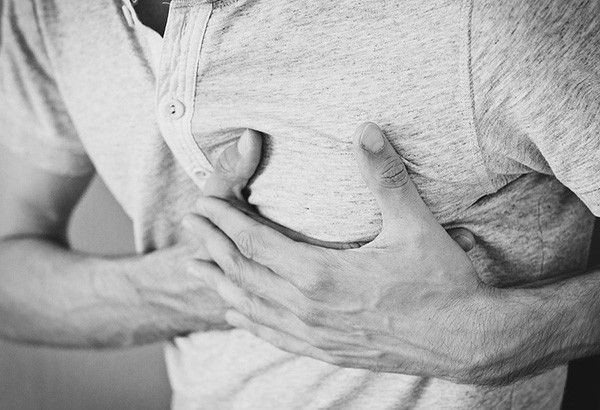El Niño's hot weather makes Filipinos more vulnerable to heart attacks, stroke

MANILA, Philippines — PAGASA (Philippine Atmospheric, Geophysical and Astronomical Services Administration) has officially declared the onset of El Niño in the country, and predicts that its effects will last until early 2024. Aside from the water shortages and the effects of extreme heat on the Philippine agriculture industry, there may be a rise in incidences of heart attacks and strokes among at-risk Filipinos.
Dr. Loudon Claro E. Antonio, a specialist in Internal Medicine - Adult/Clinical Cardiology at the Asian Hospital and Medical Center, said individuals with pre-existing heart conditions may be vulnerable to extreme weather changes.
"Our body has the capacity to cool itself but that system may be overwhelmed on a hot day. The heart has to pump harder to push our blood towards the surface of the skin as part of that cooling mechanism. If a person with high blood pressure or coronary artery disease does not get any relief from heat, they may suffer uncontrolled hypertension which may lead to heart attack and stroke," the doctor explained.
The numbers are a cause for concern. Recent data from the Philippine Statistics Authority placed coronary heart diseases as the top cause of death last year despite the coronavirus pandemic.
"Another study done locally revealed that the prevalence of hypertension is 37%. Around 52% of Filipinos are aware they are hypertensive with smoking, diabetes, obesity as prevalent risk factors and conditions," Dr. Antonio shared.
Risk factors and precautions
The leading risk factors to develop heart diseases are high blood pressure, high low density lipoprotein (bad cholesterol), diabetes, smoking, obesity and physical inactivity. Dr. Antonio explained that the presence of one or the combination of those factors places one at risk for any cardiac event.
"What's more, though heart diseases are more common in the elderly but we see a rising trend of relatively young individuals afflicted with heart problems. Awareness of one's risk is crucial in preventing a coronary episode," he added.
If you are one of those who are at-risk, he advises avoiding exposure to extreme temperatures. "It is advisable to keep cool during the hottest times of the day. Refrain from strenuous activities especially under the sun. Make sure one is getting enough fluids to prevent dehydration. Continue taking their maintenance medications as instructed by their doctors and seek consultation if they experience any chest discomfort or difficulty breathing."
Dr. Antonio also gave a list of symptoms that would warrant a trip to the emergency room.
"One should watch out for the presence of the following symptoms during hot days according to the Centers for Disease Control (CDC): Headaches or light-headedness, excessive sweating, muscle cramps, nausea and/or vomiting, fast or weak pulses and confusion should warrant a visit to the nearest emergency room for prompt evaluation and treatment," he advised.
Stay heart-healthy
Dr. Antonio said Filipinos with coronary heart disease should be aware of the ill effects on their body of this weather pattern. "A good percentage of Filipinos are not aware they are at risk. We should increase our efforts in reaching out and protect the vulnerable members of our society."
He noted that a collaborative effort from the national government, various local government units, health facilities and practitioners are needed to mitigate those known concern.
He likewise added tips on how to be "gentle with your heart" as the Philippine Heart Association (PHA) launched a campaign to encourage Filipinos to adapt a healthy lifestyle called 52100.
"It is a 5-step formula to enhance one's well-being," he said.
52100 recommends consuming: 5 servings of fruits and vegetables daily, less than 2 grams of salt per day as well as less than 2 hours of screen time, 1 hour of exercise a day. "In addition, one should not smoke and avoid consumption of sugared beverages. Healthy habits with an active lifestyle will definitely improve our quality of life."
Keep cool and carry on
The heart expert likewise advised doing your best to stay cool. "In general, it is not recommended to engage in activities requiring heavy physical exertion during extreme heat. Exercise or chores should be scheduled at times when it is more comfortable to do so such as early in the morning or late at night. If such an activity must be undertaken, we should ensure that the area is well-ventilated and has access to water or fluid to ensure hydration. One should also be aware of the warning signs of heat exhaustion or impending heat stroke."
Stress is one of the factors for developing heart disease, so Dr. Antonio advised adapting a positive mindset.
"Elevated stress cannot be avoided as it is a part of life. But we can lessen its ill effects by adapting a healthy lifestyle and a positive outlook. Maintain a support group, find a hobby that you enjoy and take that well deserved vacation. It is never too late to learn something new, as an acquired skill will bring joy and create great memories. If all else fails, remember that just like the weather, this too shall pass," Dr. Antonio said.
RELATED: DOH's dos and don'ts to prevent diseases during El Niño



















